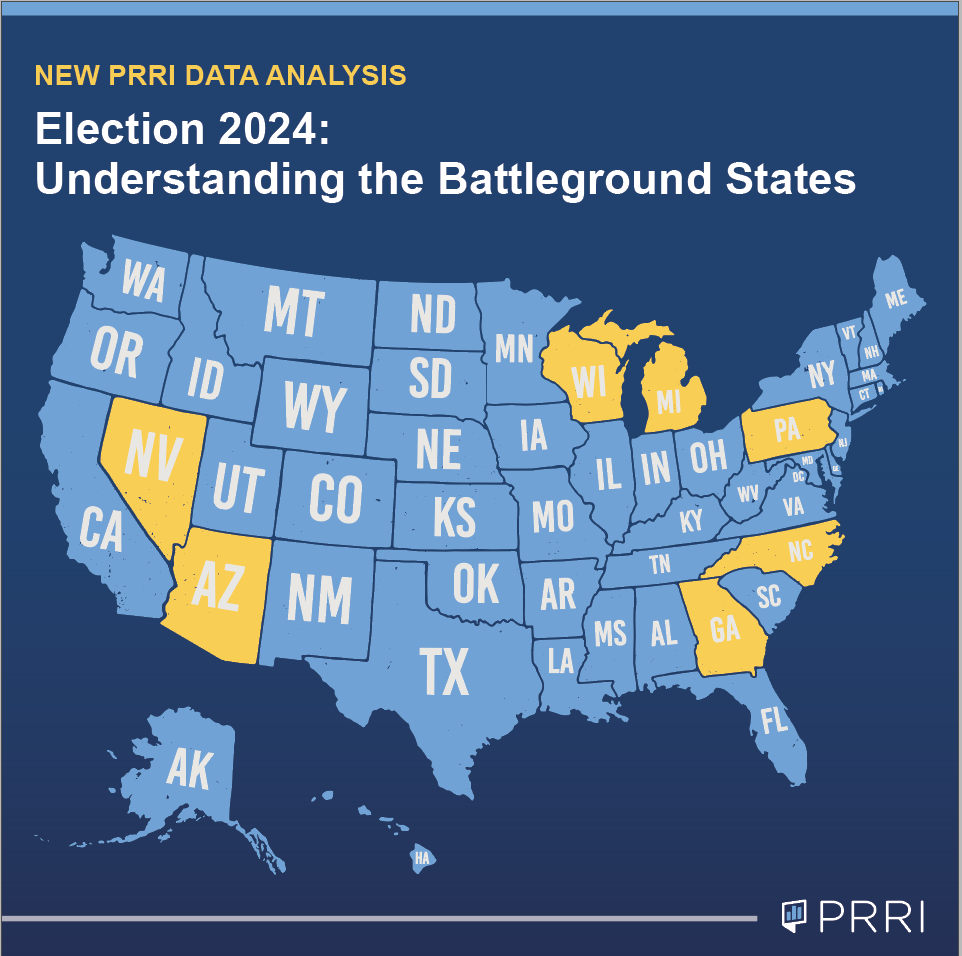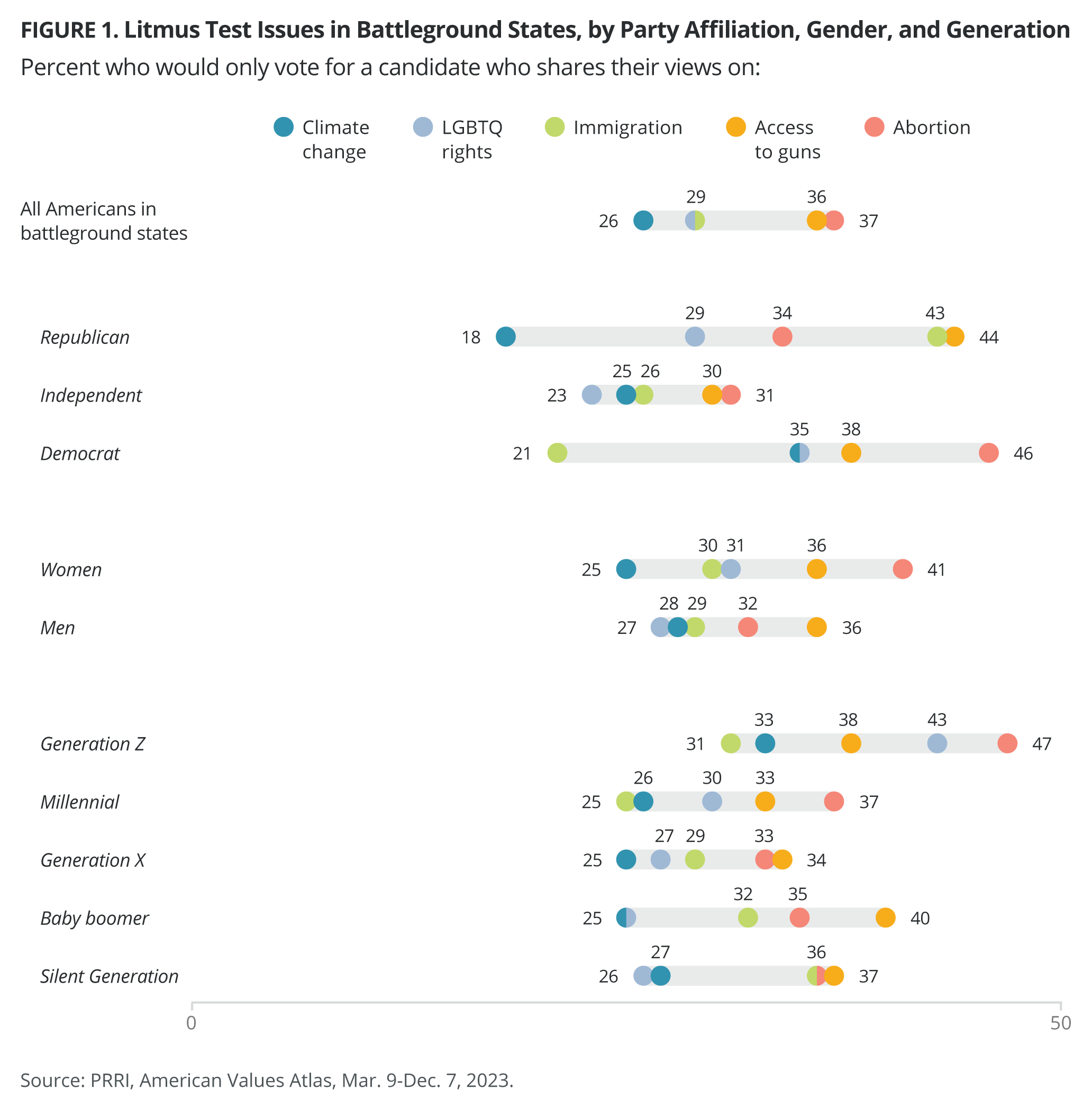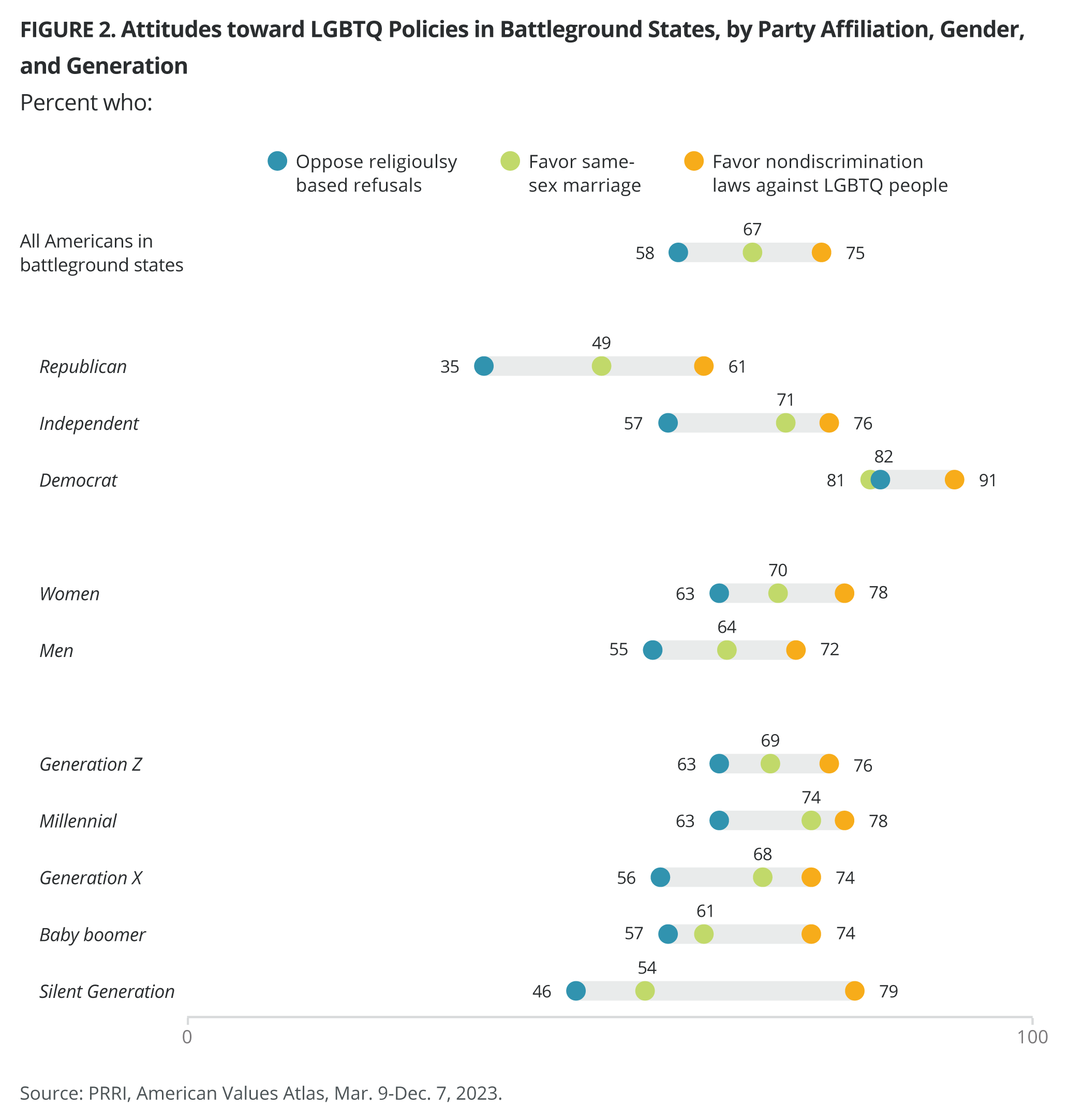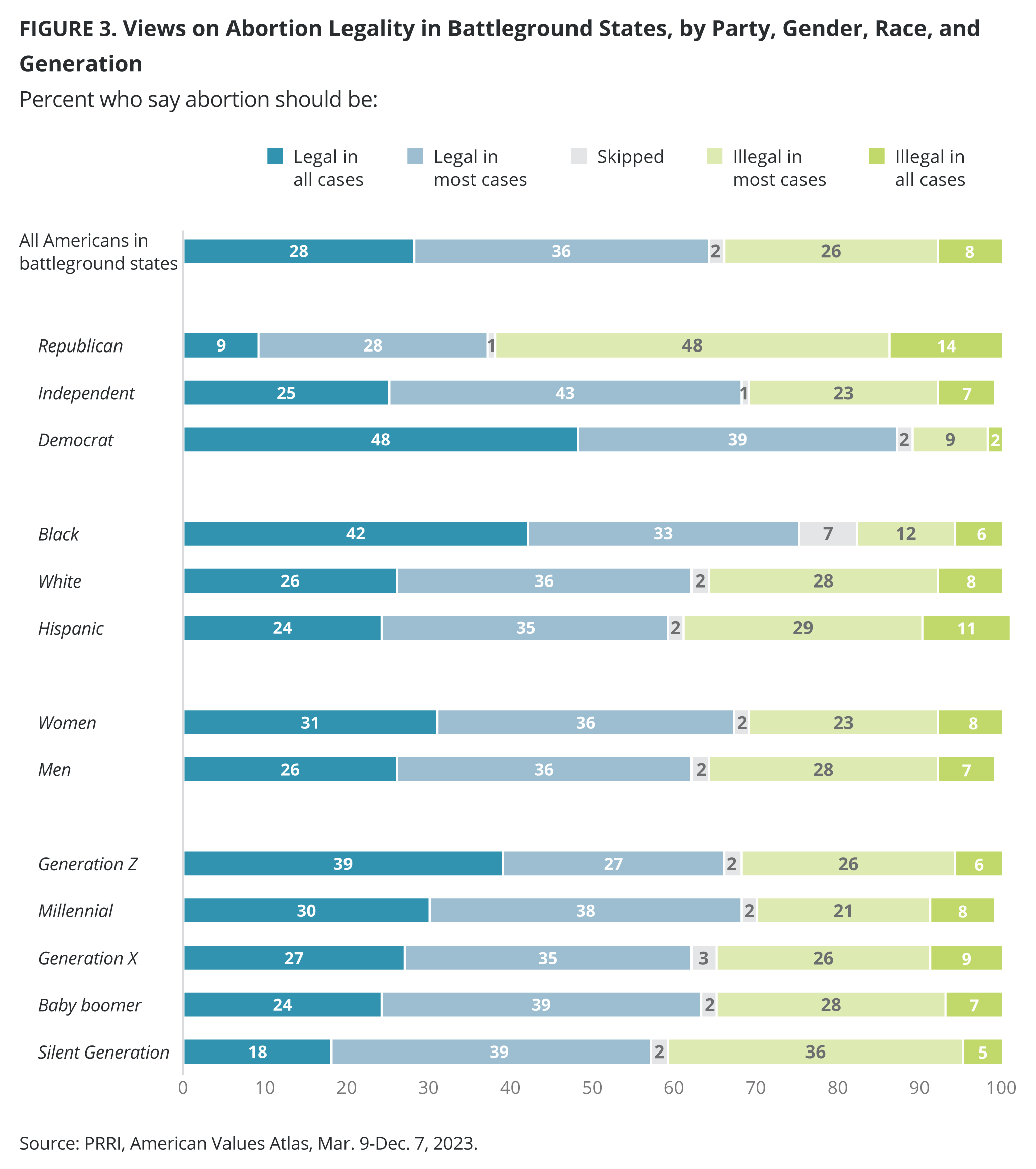 Political analysis indicates that the 2024 presidential race will likely come down to just a few key battleground states: Arizona, Georgia, Michigan, Nevada, North Carolina, Pennsylvania, and Wisconsin. PRRI’s American Values Atlas interviewed more than 22,000 adults throughout 2023, allowing us to provide a detailed profile of the demographic, religious, and political characteristics of Americans in these states as well as the importance of five political and social issues in determining their vote choice.
Political analysis indicates that the 2024 presidential race will likely come down to just a few key battleground states: Arizona, Georgia, Michigan, Nevada, North Carolina, Pennsylvania, and Wisconsin. PRRI’s American Values Atlas interviewed more than 22,000 adults throughout 2023, allowing us to provide a detailed profile of the demographic, religious, and political characteristics of Americans in these states as well as the importance of five political and social issues in determining their vote choice.
This Spotlight Analysis presents the demographic makeup of Americans living in the seven key 2024 battleground states[1] as well as their top voting issues and their views on LGBTQ policies and abortion legality.
Arizona, Georgia, Michigan, North Carolina, Pennsylvania, and Wisconsin
(*Nevada could not be analyzed individually due to low number of cases.)
The Political, Demographic, and Religious Makeup of the Swing States
When it comes to the political, demographic, and religious characteristics of residents in the seven battleground states, Americans in battleground states look similar to Americans overall, with a few key exceptions.
Politically, Americans in battleground states are evenly distributed and mirror the partisan distribution of all Americans closely, except for Republicans, with around three in ten battleground state residents identifying as Democrats (31% in both battleground states and nationally), Republicans (30% in battleground states vs. 27% nationally), and independents (28% in battleground states vs. 30% nationally[2]). More than one-third of Americans in battleground states identify as ideologically conservative (36%) or moderate (35%) and 27% identify as ideologically liberal. The political ideologies of Americans in battleground states align similarly to Americans overall.
A plurality of Americans in battleground states have a high school education or less (38%) and three in ten have some college education (28%). One in five Americans living in battleground states have a college degree (20%) and 15% have a postgraduate degree. Educational attainment among Americans in battleground states is similar to that of all Americans. Seven in ten Americans living in battleground states are white (70%), 15% are Black, and fewer than one in ten are Hispanic (9%), AAPI (4%), or multiracial (2%). Compared with Americans at large, those living in battleground states are more likely to identify as white (62% nationally vs. 70 in battleground states) and are less likely to identify as Hispanic (17% vs. 9%, respectively).
Nearly three in ten Americans in battleground states (28%) are religiously unaffiliated, which makes up the largest religious category and is comparable to the percentage of Americans who are religiously unaffiliated in the nation at large. Additionally, roughly one in ten battleground state residents identify as each: white evangelical Protestant (16%), white mainline/non-evangelical Protestant (16%), white Catholic (13%), and Black Protestant (10%). Battleground state Americans are more likely than Americans overall to identify as white evangelical Protestant (16% vs. 13%, respectively) and white mainline/non-evangelical Protestant (16% vs. 13%, respectively), and are less likely to identify as Hispanic Catholic (3% vs. 8%, respectively).
Using PRRI’s Christian nationalism scale, most Americans in battleground states, like Americans nationally, qualify as either Christian nationalism Skeptics (36%) or Rejecters (31%). About three in ten qualify as either Christian nationalism Sympathizers (19%) or Adherents (10%).
Which Issues Are Litmus Test Issues for Battleground State Voters?
Looking at key social and political issues (abortion legality, access to guns, LGBTQ rights, immigration, and climate change), Americans in battleground states hold similar views in how they weigh candidate’s positions on these issues in comparison with Americans at large.
Nearly four in ten Americans in battleground states say they would only vote for a candidate who shares their views on abortion (37%). Democrats in battleground states (46%) are more likely than Republicans (34%) and independents (31%) to say that abortion is a litmus test issue for them. The majority of white Democrats (54%) see abortion as a litmus test issue, compared with 37% of non-white Democrats. Women in battleground states (41%) and Gen Zers (47%) are also more likely than men (32%) and millennials (37%), Gen Xers (33%), baby boomers (35%), and members of the Silent Generation (36%) to say they would only vote for a candidate who shares their views on abortion
Over one-third of Americans in battleground states (36%) will only vote for a candidate who shares their views on access to guns. While there are no differences by gender, race, or generation, Republicans (44%) are more likely than Democrats (38%) and independents (30%) to see access to guns as a litmus test issue.
Around three in ten battleground state Americans will only vote for a candidate who shares their views on immigration (29%) or LGBTQ rights (29%). Republicans in battleground states (43%) are twice as likely as Democrats (21%) to vote for a candidate based on their stance on immigration, and less likely to vote based on the candidate’s position on LGBTQ rights (29% vs. 35%, respectively). Immigration and LGBTQ rights are considered litmus test issues by fewer independents in battleground states than Republicans (26% vs. 43% and 23% vs. 29%, respectively). While there are no differences by gender on immigration as a litmus test issue, women in battleground states are more likely than men to only vote for a candidate who shares their views on LGBTQ rights (31% vs. 27%). In addition, over four in ten white Democrats (44%) and Gen Zers (43%) say they would only vote for a candidate who shares their views on LGBTQ rights, compared with 25% of non-white Democrats, 25% of baby boomers, 26% of the Silent Generation, 27% of Gen Xers, and 30% of millennials.
One-quarter of Americans in battleground states would only vote for a candidate who shares their views on climate change (26%); Republicans (18%) are less likely to do so than independents (25%) and Democrats (35%). While there are no differences by generation, around four in ten white Democrats (42%) say climate change is a litmus test issue for them, compared with less than three in ten non-white Democrats (27%).

Attitudes Toward LGBTQ Rights in Battleground States
Similar to Americans nationally, Americans in battleground states show support overall for LGBTQ rights, including favoring LGBTQ nondiscrimination protections and same-sex marriage and opposing allowing religiously based service refusals.
Three in four battleground state residents (75%) favor laws that protect LGBTQ people from discrimination. Most Democrats (91%), independents (76%), and Republicans (61%) favor such laws. Across all demographics, solid majorities support nondiscrimination protections for LGBTQ people across the battleground states.
Around two-thirds of Americans in battleground states (67%) support allowing same-sex couples to marry legally. Eight in ten Democrats (81%) favor same-sex marriage, followed by seven in ten independents (71%) and just under half of Republicans (49%). Seven in ten battleground state women (70%) support same-sex marriage, compared with 64% of men. Millennials (74%) are the generation with the highest support for same-sex marriage, followed by 69% of Gen Z, 68% of Gen X, 61% of baby boomers, and 54% of the Silent Generation.
Nearly six in ten Americans in battleground states (58%) oppose allowing business owners to refuse products or services to LGBTQ individuals if doing so violates their religious beliefs. Democrats (82%) are more than twice as likely as Republicans (35%) to oppose allowing religiously based refusals. Independents in battleground states (57%) closely mirror all Americans on this question. Nearly two-thirds of women in battleground states (63%) oppose religiously based service refusals, compared with a slim majority of men (55%). Around six in ten Gen Zers (63%), millennials (63%), Gen Xers (56%), and baby boomers (57%) oppose these refusals, compared to less than half of the Silent Generation (46%).

Attitudes Toward Abortion in Battleground States
The majority of battleground state residents support abortion legality at rates similar to Americans at large. Nearly two-thirds of Americans in battleground states (64%) support legal access to abortion, including nearly three in ten who say it should be legal in all cases (28%) and more than one-third who say it should be legal in most cases (36%). Around one in four say abortion should be illegal in most cases (26%) and only 8% say it should be illegal in all cases. Most Democrats in battleground states (87%) and more than two-thirds of independents (68%) support abortion legality in all or most cases, compared with 37% of Republicans. These figures are comparable to attitudes among all Americans.
Women in battleground states are slightly more likely than men to support abortion legality (67% vs. 62%, respectively), as are Black Americans (75%) compared with white (62%) and Hispanic Americans (59%). The majority of each generation supports abortion legality, including 68% of millennials, 66% of Gen Zers, 63% of baby boomers, 62% of Gen Xers, and 57% of the Silent Generation. Notably, in the battleground states, Gen Z is the generation most likely to support abortion legality in all cases (39%).

Learn more about each battleground state’s demographics and litmus test issues:
*There is no Nevada Spotlight Analysis as Nevada could not be analyzed individually due to low number of cases.
[1] Battleground states include: Arizona, Georgia, Michigan, Nevada, North Carolina, Pennsylvania, and Wisconsin
[2] This difference is not statistically significant.




